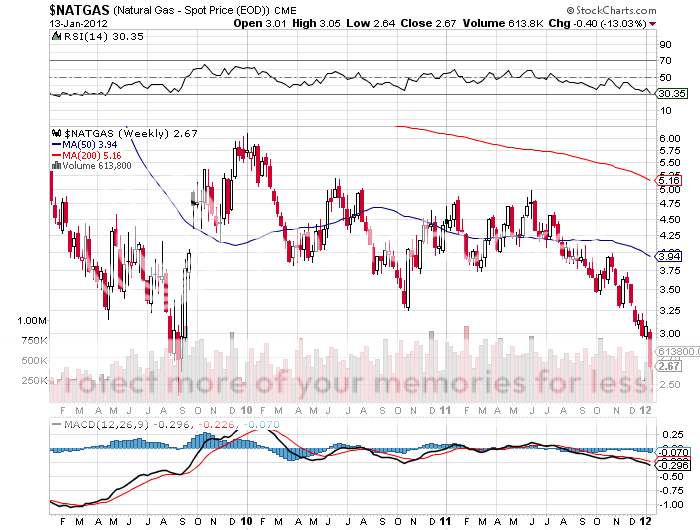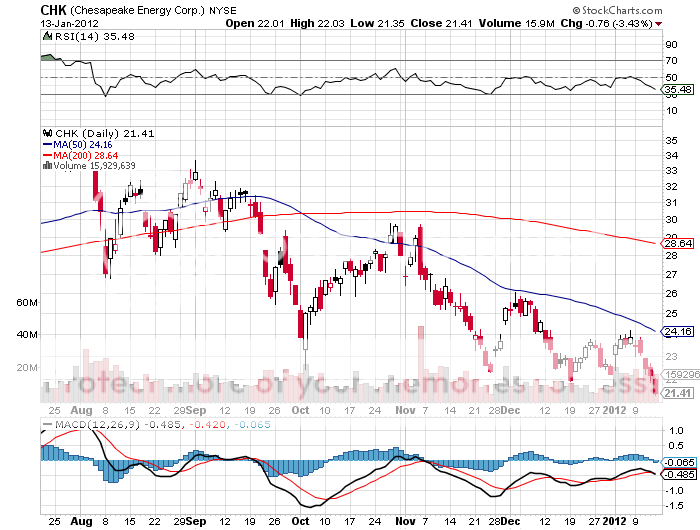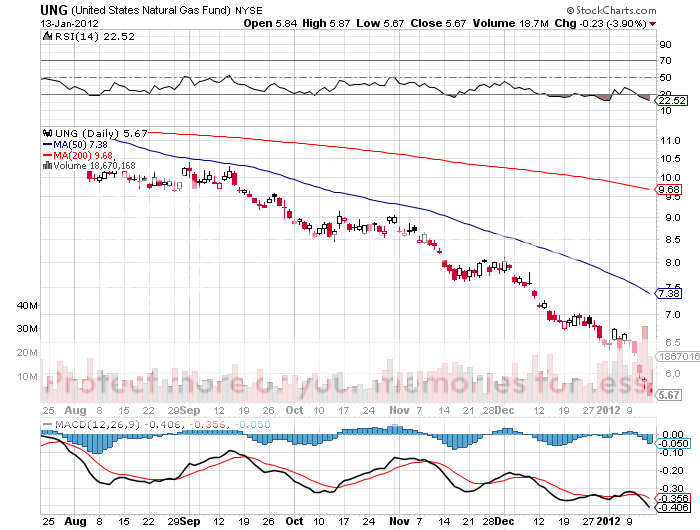Natural Gas Goes Down in Flames
I received a scratchy and barely audible call from my buddy out in the Barnet natural gas fields just outside of Fort Worth, Texas the other day. With the price for CH4 decisively breaking through $3/MBTU yesterday, traders were now resigned to seeing a new ten year low in the near future, possibly as low as $2. The men on the rigs were getting restless, fearing layoffs in their future. Did I have any insights?
Natural gas has been your worst nightmare of a commodity since its peak at $14 in 2008, then riding on crude?s coattails in its infamous run to $149/barrel. Since then, natural gas has cratered 80%, and is down 37% from its 2011 top.
You can blame the new ?fracking? technology, which in the last four years has unlocked a 100 year supply of natural gas in shale fields, that until recently, were considered unproductive. Hard bitten roustabouts with a line of crude permanently under their fingernails have been driving their RV?s to previously unknown destinations, like Pennsylvania, Alabama, West Virginia, North Dakota, and even California. There is probably a second 100 year supply out there, but with prices so low, what is the point in looking. Europe and China have as much untapped ?unconventional gas? under their feet, since their geology is similar, if they could only figure out the technology.
Fracking involves drilling down to 7,000 feet, filling the well with a liquid, and then letting off an explosive. The shock wave shatters the shale formation, allowing the gas to flow freely. While there have been numerous complaints about contamination of ground water by toxic chemicals, every case I investigated could be traced to an incompetent contractor inexperienced in the technology.
I was one of a handful of venture capitalists who helped pioneer fracking in the Barnet a dozen years ago who the locals considered crazy. You want to spend $1 million on a new well and then blow it up? That skepticism allowed me to snap up leases for mineral rights depleted by conventional means for pennies on the dollar.? My back still hurts when I think about driving down those bumpy washboard roads.
By 2005, it was clear to me that the technology worked and would have a hugely negative long term impact on prices. All that was needed was for the majors to move in. So I sold out my interest to a major production company and never looked back.
For the last three years, the natural gas industry has not been a happy place. Share prices of industry leaders like Chesapeake (CHK) and Devon (DVN) have been hammered as competitors sought to offset falling prices with increased volumes. The result has been a glut of this deeply despised molecule of Biblical proportions. There is a risk that production could overwhelm storage by this summer, leading to even lower prices. Natural gas is now even cheaper than some of the higher grades of coal, like anthracite, which was once unthinkable.
Gas prices are now 15% of the cost of oil on an equivalent BTU basis. So if you own one of the few natural gas cars around this means you are buying fuel at 60 cents a gallon. Since gas burns so cleanly, you probably can go 100,000 miles between tune ups. Your carbon emissions are half of what a gasoline engine generates, and there are no poisonous nitrogen or sulfur dioxides.
So why aren?t we all driving natural gas powered cars by now? You can blame the heavy hand of government regulation. Energy is one of the most heavily regulated industries in the country. To use even a fraction of the gas we are producing, massive deregulation of the transportation, distribution, and sale of natural gas is required.
Former corporate raider and oil man, Boone Pickens, has been attempting to do exactly that with an $80 million lobbying campaign on Capitol Hill. His proposals include relaxed controls on building new gas pipelines and tax subsidies for the conversion of heavy trucks and fueling stations. But he has been blocked at every turn by oil industry lobbyists who want to keep us all hooked on the black stuff for as long as possible.
The discovery of these enormous new energy supplies will precipitate the greatest change to the global economy over the next three decades. The US, the ?Saudi Arabia? of natural gas, will flip from a large energy importer to a large exporter, primarily to China. All of a sudden, all those expensive wars in the Middle East are meaningless, as is the Keystone pipeline.
I think the way this ends is that the oil industry buys the entire natural gas industry. Prices are now so cheap they can do this for pocket change. That makes every gas producer out there a potential takeover target. With 150 years of management expertise, a deep pool of engineering talent, cash coming out of their ears, and existing distribution networks in place, who better to do this? This is already well underway, with Exxon?s purchase of XTO Energy a year ago a perfect example.
Unfortunately, there are few trades here with which we can participate. I pleaded with readers to stay away from gas for all of 2011. It never rallied much last year, so there weren?t any great entry points on the short side. You are better off to focus on companies that profit from volume, not price. One candidate is Cheniere Energy (LNG), which is gearing up to liquefy natural gas for export from the US to Asia.
As for my friend?s crew, I told him not to worry. If drilling does scale back in the Barnet there was always plenty of work in North Dakota?s Bakken field, where fracking is being more widely applied to oil production. Roustabouts were commanding salaries well in excess of $100,000 a year there with benefits up the wazoo. Sure, the weather sucks, and it is a very long trip to a Dallas Cowboys game. But it beats the hell out of going on unemployment.
It is Getting Cheap, Isn?t It?






